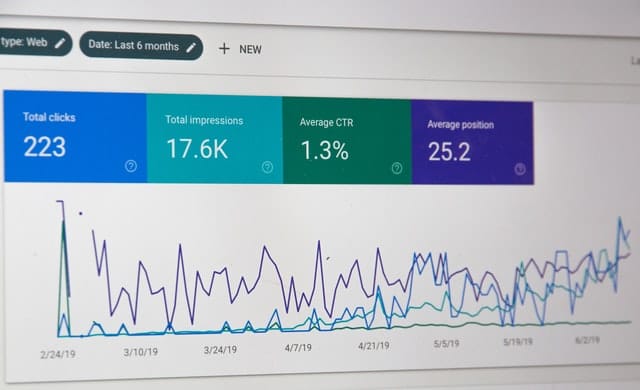Are you looking for ways to improve your website’s search engine ranking? If so, then you need to know about search engine optimization (SEO).
SEO is the process of improving the visibility and ranking of a website or web pages in search engine results pages (SERPs). It’s a means of increasing the quantity and quality of traffic to a site from search engines, ideally resulting in increased sales and leads.
There are numerous benefits that businesses can enjoy by implementing SEO, such as increased traffic, improved brand awareness, and higher conversion rates. However, SEO can also be a complex and time-consuming process, particularly if a business is not familiar with the latest trends and best practices.
In this Search engine optimization for dummies guide, we’ll cover everything you need to know about optimizing your website for Google. We’ll start with a basic overview of how SEO works, then we’ll dive into the specifics of what you can do to improve your website’s ranking.
So if you’re ready to learn more about how to get your website to the top of Google’s search results, read on!

What is Search Engine Optimization?
SEO is the process of improving the visibility and ranking of a website or web page in the search engine results pages (SERPs) of major search engines. This can be done through optimizing the website content, structure, and on-page elements like titles, metatags, and anchor text, as well as developing off-page SEO tactics like link building and social media engagement.
The goal of SEO is to increase organic search traffic from search engines like Google, Bing, and Yahoo. Just remember that Google is going to be your main focus because as of March 2022 they made up 76% of all search traffic.
While there is no guaranteed way to achieve a top ranking on SERPs, intentional and strategic optimization efforts can improve a website’s visibility and help it attract more qualified leads and higher levels of organic search traffic. As such, SEO is an important part of any digital marketing strategy.
On-Page SEO and Off-Page SEO – What’s the Difference?
When it comes to SEO, there are two main types: on-page and off-page. Simply put, on-page SEO refers to the factors that can be controlled on your own website, such as meta tags (title tags and meta descriptions) as well as using keyword phrases (which can be determined using SEO tools).
Off-page SEO, on the other hand, encompasses the actions that you take outside of your website to influence your search rankings. This can include things like link building and social media engagement. While both types of SEO are important, they each have their own distinct advantages.
On-page SEO is typically quicker and easier to implement than off-page SEO because it doesn’t require any action outside of your website. Furthermore, on-page optimization is something that you have complete control over.
Off-page SEO, on the other hand, can take more time and effort to implement. However, it can be more effective in the long run because it involves building relationships and creating authority for your website. When done correctly, off-page SEO can help you to earn high-quality links (backlinks) and boost your search engine rankings.
Both on-page optimization and off-page optimization are important for businesses and website owners that want to improve their search engine rankings.
SEO Strategies: Black Hat vs White Hat SEO
When it comes to SEO, there are two main approaches: black hat SEO and white hat SEO.
As the names suggest, black hat SEO refers to techniques that are used to improve search engine rankings in an unethical manner. This might include buying links, keyword stuffing, or using hidden text.
White hat SEO, on the other hand, refers to techniques that are used to improve search engine rankings in a legitimate way. This might include optimizing titles and meta descriptions, creating high-quality content, or building links through guest blogging.
While black hat SEO can be effective in the short term, it’s not sustainable in the long term. Search engines are always getting better at detecting these techniques, and they will penalize websites that use them. As a result, it’s important to focus on white hat SEO techniques if you want your website to be successful in the long run.
What Are The Benefits of Search Engine Optimization for Businesses?
When done correctly, SEO can be a very effective tool for businesses and website owners of all sizes. One of the main benefits of SEO is that it can help increase your website’s visibility in search results. This, in turn, can lead to more website visitors, which can ultimately result in more customers and sales.
Additionally, SEO can help you to improve your website’s overall quality, making it more user-friendly and improving your chances of earning higher search rankings. If done correctly, SEO can be a very beneficial tool for businesses large and small.
How Can Businesses Implement Search Engine Optimization Strategies?
Businesses can implement SEO strategies in a number of ways. One common approach is to do the proper keyword research and use keyword-rich titles and descriptions for their website pages. This helps to ensure that their pages are more likely to be found by search engines when someone searches for relevant keywords.
Another strategy is to create fresh, original content on a regular basis. This helps to keep their website pages relevant and up-to-date, which can also improve their search engine rankings.
Finally, businesses can also utilize social media platforms to promote their website and content. By sharing links to their website on social media, they can reach a wider audience and attract more visitors to their site. By using these and other SEO strategies, businesses can improve their visibility online.
What is Local Search Engine Marketing (SEM)
Local SEM is the process of optimizing a website to rank higher in search results for location-based keywords. This is done through a variety of methods, including improving on-page content, building citations, and creating local landing pages.
Local SEM is an important part of any business’s online marketing strategy, as it helps to ensure that potential customers in the area can find the website when they search for relevant keywords.
With the right local SEM plan, businesses can achieve a higher ranking in search results, resulting in more website visitors and leads.
How to Optimize Your Website for Local SEO
As I mentioned before, local SEO is important for businesses that want to be found online by potential customers in their area. If you’re not sure how to optimize your website for local SEO, here are a few tips:
- Include your business name, address, and phone number (NAP) on your website.
- Add location pages and service pages for each of the areas you serve.
- Optimize your website for local keywords.
- Build backlinks from local websites.
- Claim your Google My Business listing.
- Get listed in online directories.
- Monitor your online reputation.
What are Backlinks and How Do They Work?
I mentioned backlinks and you might be wondering what exactly that means.
A backlink is a link from one website to another. When a website links to your site, it’s called a backlink. Backlinks are important because they are like votes of confidence for your site. They show that other websites think your site is worth visiting. Google looks at backlinks when it ranks websites in its search engine results pages (SERPs).
The more backlinks you have from high-quality sites, the higher your site will rank. So, backlinks are a good way to get traffic to your site and improve your SEO.
Dofollow vs. Nofollow Links
There are two types of backlinks: dofollow and nofollow. Dofollow backlinks pass along what’s called “link juice”. Link juice is the ranking power that a backlink passes from one site to another. So, when a website links to your site with a dofollow link, it’s giving you some of its ranking power. This can help your website to rank higher on Google search result pages.
Nofollow backlinks, on the other hand, don’t pass along link juice. Google introduced the nofollow link attribute in 2005 to combat spammy blog comments. There are different types of nofollow links, but they all essentially tell Google not to follow or credit the link. So, when a website links to your site with a nofollow link, it’s not giving you any of its ranking power.
Backlinks are an important part of any SEO strategy because they show Google that your site is popular and authoritative. The more high-quality backlinks you have, the higher your SERPs.

How to Optimize Your Website for Mobile SEO
Mobile SEO is important for businesses that want to be found online by potential customers on mobile devices. If you’re not sure how to make your site mobile friendly, here are a few tips:
- Use responsive design.
- Use a mobile-friendly theme.
- Optimize your images for mobile.
- Use AMP pages.
- Accelerate your mobile website.
- Monitor your mobile SEO.
By following these tips, you can optimize your website for mobile SEO. The end result is improving your chances of being found in search engine indexes by potential customers.
What are some common misconceptions about search engine optimization?
SEO is often seen as a dark art, shrouded in mystery and full of false promises. However, there are a number of misconceptions about search engine optimization that can lead businesses astray.
One common misconception is that search engine optimization is all about keywords. While keywords are important, they are only one part of the puzzle. Search engine optimization also takes into account factors such as site structure, content, and link building.
Another common misconception is that search engine optimization is a one-time process. In reality, search engine optimization is an ongoing process that requires regular updates and monitoring of search engine algorithms to ensure continued success.
By dispelling these myths and understanding how SEO really works, businesses can set themselves up for success.
How Can Businesses Stay Up-To-Date On The Latest Trends In Search Engine Optimization?
Any business that wants to be successful needs to stay up-to-date on the latest SEO trends. After all, SEO is constantly evolving, and what works today may not work tomorrow.
To stay ahead of the curve, businesses need to keep track of the latest changes in search algorithms and adjust their SEO strategies accordingly.
Additionally, they need to be proactive about research, experimenting with new keywords and tactics to see what works best for their particular website.
Finally, businesses need to monitor their own search engine rankings on a regular basis to ensure that they are still making progress. By staying informed and adaptable, businesses can ensure that their SEO efforts are always effective.
The Bottom Line – Search Engine Optimization for Dummies
SEO is a critical part of any online marketing strategy. By understanding search engine basics, how SEO works, and staying up-to-date on the latest trends, businesses can ensure that their website is visible to potential customers.






